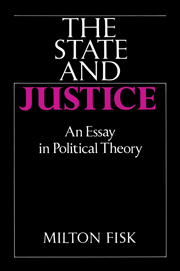Book contents
- Frontmatter
- Contents
- Preface
- Introduction: Can the state rule without justice?
- Part One An outline of a materialist political theory
- Part Two An assessment of the place of justice in the state
- Part Three A functional view of political institutions
- Part Four An account of the community of states
- Part Five A reflection on the transition to a new kind of state
- Conclusion: State, class, and democracy
- Notes
- Index
Part Two - An assessment of the place of justice in the state
Published online by Cambridge University Press: 06 July 2010
- Frontmatter
- Contents
- Preface
- Introduction: Can the state rule without justice?
- Part One An outline of a materialist political theory
- Part Two An assessment of the place of justice in the state
- Part Three A functional view of political institutions
- Part Four An account of the community of states
- Part Five A reflection on the transition to a new kind of state
- Conclusion: State, class, and democracy
- Notes
- Index
Summary
This part deals with justice as the form of ruling, and the next deals with the economic function of ruling. There will be considerable overlap since justice affects the way the state functions for the economy and hence affects the economy itself. Conversely, the economy and the state's functioning for it partly shape the struggles that eventuate in a pattern of justice.
This part has two major goals. The first is to state and defend a materialist conception of justice, which is part of a broader materialist conception of morality worked out earlier in my Ethics and Society. The second is to illustrate the effect of state justice on economic factors.
In addition to state justice, there is also the radical justice of opposition groups. State justice comes from the interest of rulers in continued rule. That interest leads them to adjust the demands of groups in the divided society they rule by the imposition of limits on benefits and losses. Yet a typical opposition group within a divided society will not view the justice of its state as valid from the perspective of that group's best interests. An ascendant opposition group will go further and project a new set of limits on benefits and losses against the state's official pattern of justice. This new set of limits is a radical justice. It has to satisfy two requirements: It must be more favorable than state justice to the interests of the opposition group, and it must be a basis for ruling, giving some weight to the interests of other groups through putting limits on the realization of its own interests.
- Type
- Chapter
- Information
- The State and JusticeAn Essay in Political Theory, pp. 65 - 66Publisher: Cambridge University PressPrint publication year: 1989



